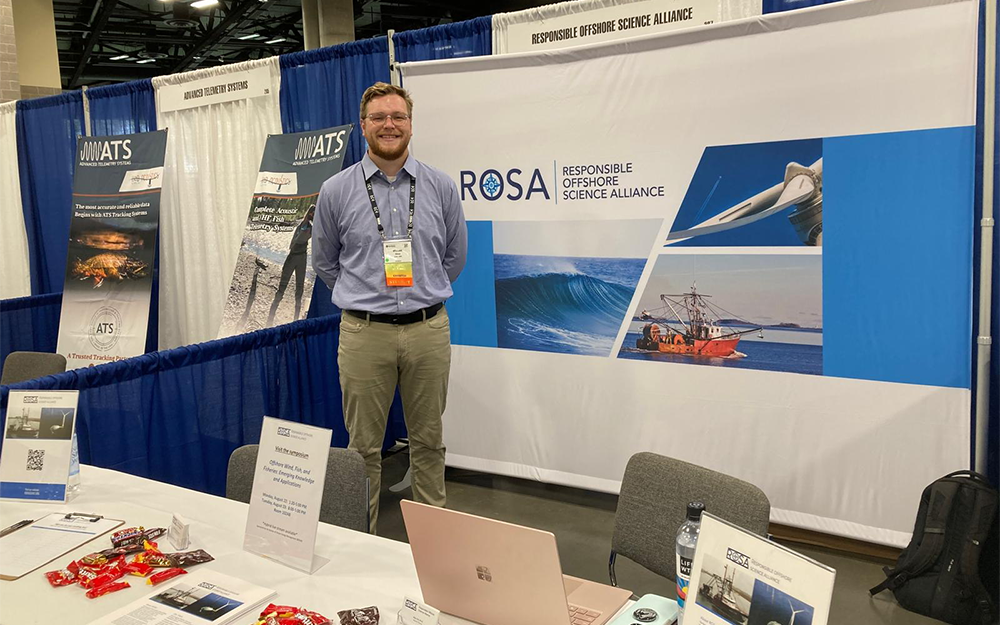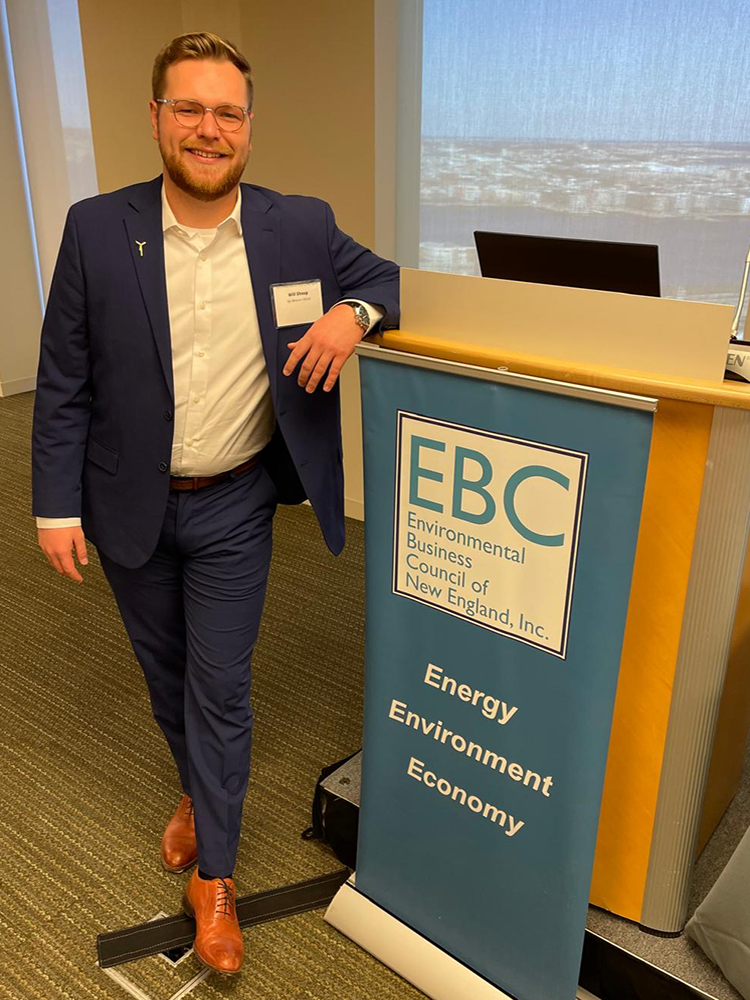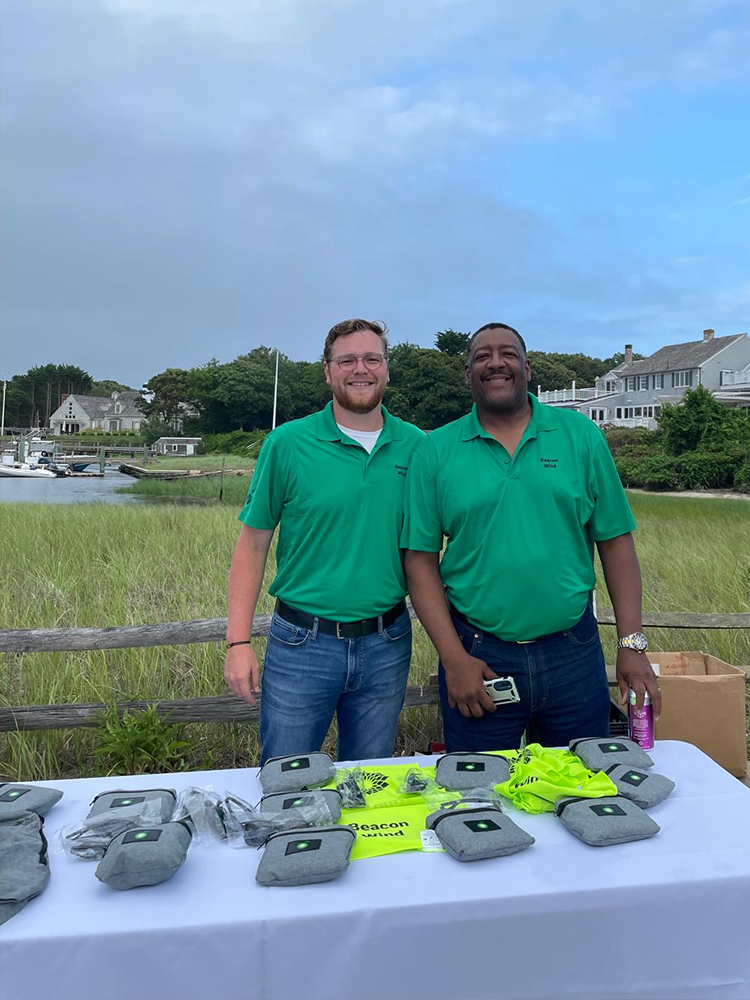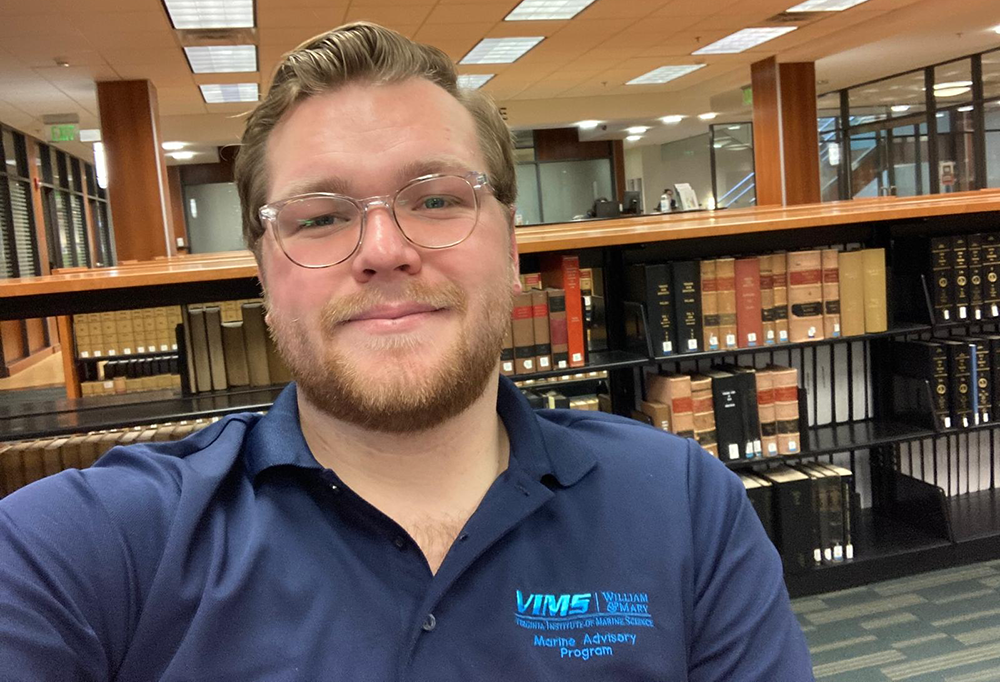A direct path to an invigorating and meaningful career
William Shoup M.A. ’23 sees a clear connection from his Batten School & VIMS experiences to his current work in renewable energy
 William Shoup, a member of the inaugural M.A. program cohort, is a testament to the learning opportunities and professional growth fostered at William & Mary's Batten School & VIMS. After undergraduate studies at the University of South Carolina and an internship with a nongovernmental organization, Shoup said, “I realized I was more interested in the policy extension side than research science.”
William Shoup, a member of the inaugural M.A. program cohort, is a testament to the learning opportunities and professional growth fostered at William & Mary's Batten School & VIMS. After undergraduate studies at the University of South Carolina and an internship with a nongovernmental organization, Shoup said, “I realized I was more interested in the policy extension side than research science.”
When he arrived at the Batten School of Coastal & Marine Sciences & VIMS, specifically working in the Marine Advisory Program (MAP), he thought, “this is exactly what I’m looking for.”
Today, Shoup is a stakeholder relations associate with Invenergy, where he liaisons between the energy company and the communities in which they build solar and wind projects. It’s a role at the nexus of science, policy and communication, and he credits the Batten School & VIMS with sharpening his presentational skills, as well as providing invaluable opportunities for professional networking.
“I’ll sing my praises for it,” Shoup said of the M.A. program. “It really worked out for me.”
Influential, applied-science experiences
At the Batten School & VIMS, Shoup eagerly sought out exposure to practical applications of what he was learning in the classroom, from an assistantship researching scallops to working with educators on crafting a lesson plan for the annual Blue Crab Bowl academic competition. “I really got to see all different sides,” he said.
 David Rudders Ph.D. ’10, assistant research professor and associate director of MAP, played a key role in expanding Shoup’s skillset as his academic advisor. “The number one skill I learned was being comfortable speaking in front of people. Dave prioritized that big time,” said Shoup.
David Rudders Ph.D. ’10, assistant research professor and associate director of MAP, played a key role in expanding Shoup’s skillset as his academic advisor. “The number one skill I learned was being comfortable speaking in front of people. Dave prioritized that big time,” said Shoup.
“From the time we got there, we had monthly meetings with the lab and every month somebody had to get up and present. I was really uncomfortable with that all through undergrad, but I got to have that practice opportunity in grad school and now it's something I do all the time.”
For his capstone project, Shoup worked with Rudders to apply radio frequency identification (RFID) technology to premium seafood markets. “We were thinking about how we could identify a product as being caught in a specific location, bring that information all the way to market and better inform seafood consumers and regulators,” said Shoup.
The project leaned on his skills as a communicator, and Shoup says that “Even though it didn’t exactly line up with where I went in my career, it solidified that I want to be the guy who’s out there communicating between two or more groups of people.”
Transitioning to renewable energy
With help from Rudders’ industry connections, Shoup was accepted for an internship with the Responsible Offshore Science Alliance [ROSA], a nonprofit organization that aims to be an objective resource for information related to the effects of offshore wind energy development on fisheries. “However you're connected to the offshore wind industry, you use ROSA as a touch point to have tough conversations, work out data-sharing agreements, find research gaps and more,” said Shoup.
 As he wrapped up the internship, Shoup’s boss recommended him for a role at a consulting firm. “My boss at ROSA knew the founder of Sea Risk Solutions and introduced me to him. I started working for them before I even wrapped up my degree.” As a marine policy specialist contracted as a liaison to BP for their offshore wind projects, Shoup served as a “go-between” for the energy company and the fishing industry.
As he wrapped up the internship, Shoup’s boss recommended him for a role at a consulting firm. “My boss at ROSA knew the founder of Sea Risk Solutions and introduced me to him. I started working for them before I even wrapped up my degree.” As a marine policy specialist contracted as a liaison to BP for their offshore wind projects, Shoup served as a “go-between” for the energy company and the fishing industry.
Changes in national trends surrounding offshore energy led Shoup to transition to a similar role with onshore energy company Invenergy, which currently holds approximately 10% of the renewable energy market share in the United States. Today, he is a stakeholder relations associate, communicating with farmers and other rural residents about wind and solar projects in their communities.
“We work directly with landowners, county boards and state government to ensure our work is not just mutually profitable but also responsible and sustainable,” he said.
A key part of that work is translating scientific and technical knowledge into more accessible language, a skill Shoup says he refined at the Batten School & VIMS. “Picking up a new industry, that’s something I had to do when I got into the scallop industry at VIMS, and when I got into the offshore wind industry during my internship. The ability to break a complicated industry down into components that are digestible and making yourself comfortable operating in that world, that all came from VIMS.”
Shoup also credits the Batten School & VIMS network with advancing his professional journey. “I got into my career because my advisor was looking out for my talents and what I wanted to do and finding an avenue to foster that. It really has been a direct path from an M.A. internship into full-time work, just based on networking and being a part of the program. I'm very fortunate, but you learn that you meet people and, if you're nice to them and you do a good job, then it pays down the road.”
A community without boundaries
Shoup is unrestrained when further reflecting on the Batten School & VIMS community. “I loved my time at VIMS,” he said. “The sense of community was great. There’s always something going on, I always felt welcomed and there was always support. You can turn to older students, then you have your advisor and the people running the program. There was always somewhere to go if you had any kind of problem, and it always got solved.”
Part of that welcoming spirit came from helpful mentors along the way, especially Kaitlyn Kowaleski Ph.D. ’25, a doctoral student working in the scallop lab, and Molly Mitchell Ph.D. ’18, the M.A. program director.
“Kaitlyn was the senior person in our lab and she took the time to introduce herself to me,” said Shoup, “She did a lot to get me involved in what was going on, introduced me to people and gave me a sense of how I should be allocating my time as a student.”
He also credits Mitchell for running a seamless program for an inaugural cohort. “She was building the plane as she was flying it, but she did such a good job of making sure we were on track.”
 The most memorable moments for Shoup were the field research trip to the Eastern Shore Laboratory, which he described as “a staple that you don’t get with a lot of schools,” and his capstone defense. “The last couple of weeks when I was finishing up and getting ready to do my capstone presentation, I felt such a sense of accomplishment,” he said.
The most memorable moments for Shoup were the field research trip to the Eastern Shore Laboratory, which he described as “a staple that you don’t get with a lot of schools,” and his capstone defense. “The last couple of weeks when I was finishing up and getting ready to do my capstone presentation, I felt such a sense of accomplishment,” he said.
Shoup’s positive experiences exemplify the importance of investing in the full graduate school community. He summed up his time at the Batten School & VIMS by saying, “You do your work, you work hard and then the fun stuff pops up and you enjoy it that much more. And that's without boundaries of age or department or program. If you're in, you're in.”
Encouragement for students
A relatively recent alumni, with graduate school memories still fresh in-mind, Shoup has wise words for current students at the Batten School & VIMS. “Dive into what you're good at and what you like to do,” he said. “You really can forge something very special that could be a launching point for a career. You get 18 months to turn this into a career, so take advantage of traveling, meeting people and getting exposed to different areas of your field. Those opportunities are there, and VIMS has the connections.”
For prospective students, Shoup’s endorsement of the Batten School & VIMS is clear: “I had a great time there. Getting the chance to talk to other folks who went to different schools and had very different experiences, nothing seems like it compares to the sense of community that I felt when I was at VIMS.”
This alumni profile was published in July, 2025.

